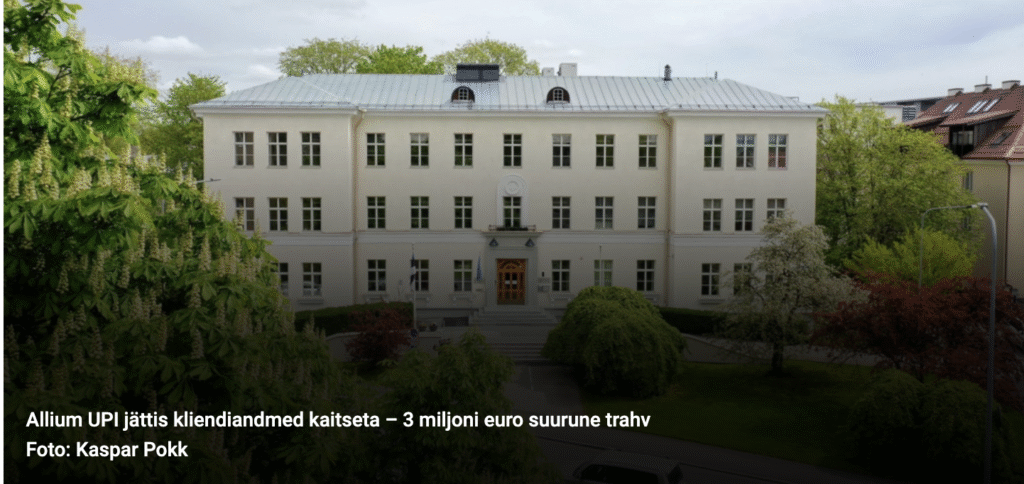Estonia is joining in on letting businesses that operate in Europe know that they will be fined if they don’t respect users privacy. On September 5, 2025, Estonia’s Data Protection Inspectorate (Andmekaitse Inspektsioon) delivered a stark reminder of this reality, slapping Allium UPI OÜ, the operator behind the popular Apotheka pharmacy chain’s loyalty scheme, with a €3 million fine for leaving customer data woefully unprotected. This isn’t just another GDPR fine that blends in with the other billions that are fined; it’s a damning indictment of how even established players in health and retail can treat data security as an afterthought, exposing hundreds of thousands to identity theft, fraud, and privacy erosion.
The breach, uncovered in early 2024, stemmed from glaring deficiencies in Allium UPI’s information systems. Hackers—or perhaps opportunistic insiders—gained unauthorized access to the Apotheka loyalty program’s database, laying bare sensitive details of over 750,000 individuals. We’re talking names, personal identification codes, email addresses, phone numbers, home addresses, and—most alarmingly—a decade’s worth of purchase histories from 2014 to 2020. For customers of a pharmacy chain, this isn’t abstract; it includes records of medications, health metrics, pregnancy tests, ovulation kits, hearing aids, blood pressure aids, intimate hygiene products, and dermatological treatments. Vulnerable groups, including children, were hit hardest, their most private health journeys now potentially fodder for scammers or worse. In an era of rising cyber threats, where health data is gold for cybercriminals, this exposure doesn’t just violate GDPR’s core tenets—it’s a betrayal of the implicit pact between consumer and company.

The Inspectorate’s investigation painted a picture of systemic neglect: no multi-factor authentication, unsecured database backups, absent activity logging, and fuzzy role definitions that left access controls porous. Allium UPI, whose business model thrives on processing this very data to fuel targeted marketing and loyalty incentives, failed at the basics. As Pille Lehis, the Inspectorate’s director, put it bluntly: “If a company’s business model relies on processing customer data, protecting them must be an integral part of the business model. Every company to which customers entrust their data has an obligation to protect and securely store them.” The fine, calibrated against the breach’s scale, data sensitivity, victim count, and the firm’s turnover, clocks in at €3 million—a hefty sum, but one that pales against the potential reputational hemorrhage. Allium UPI has 15 days to appeal, but the damage is done; headlines like this erode customer faith faster than any loyalty points can rebuild it.
This saga underscores a troubling trend in GDPR enforcement across Europe: fines are escalating, but so are the stakes. Estonia’s watchdog, like its counterparts in France or Ireland, isn’t wielding the penalty hammer lightly. As jurist Jekaterina Aader emphasized, “The fine is the last resort, aimed at enforcing accountability and prevention.” Yet, for companies like Allium UPI, the real cost transcends euros. Beyond the immediate payout, there’s the shadow of lawsuits from affected customers, regulatory scrutiny that could drag on for years, and a tarnished brand in a sector where trust is paramount. Pharmacies aren’t tech giants with endless PR budgets; a loyalty program breach like this could drive users to competitors, slashing retention rates and future revenues. Globally, data breaches already cost businesses an average of $4.88 million in 2024, per IBM—add in Europe’s stringent rules, and the math gets uglier.
What makes this case particularly galling is its preventability. GDPR, now seven years old, mandates continuous monitoring, vulnerability patching, and robust access controls for data processors. Allium UPI’s lapses weren’t exotic hacks but failures in foundational hygiene—echoing breaches at bigger names like Transunion, Equifax or Marriott, where corner-cutting on security invited disaster. In health-adjacent spaces, the implications ripple further: exposed medical purchase data could fuel discrimination in insurance or employment, or worse, targeted extortion. For Estonian consumers, already navigating a small-market economy with limited alternatives, this feels like a double whammy—your health secrets spilled, and your loyalty rewarded with vulnerability.
The silver lining, if one can call it that, lies in the Inspectorate’s proactive stance. By publicizing the fine and detailing the shortcomings, they’re not just punishing; they’re educating. This could catalyze a wave of audits in Estonia’s retail and health sectors, where loyalty programs gobble data with abandon. Companies would do well to heed the call: integrate data protection not as a compliance chore, but as a strategic imperative. Appoint dedicated officers, invest in AI-driven threat detection, and treat privacy as a selling point—after all, in a post-breach world, “We protect your data like our own” beats “Sorry, we messed up.”
Allium UPI’s €3 million reckoning is more than a fine; it’s a siren for Europe’s data-driven economy. As cyber risks mount with AI and IoT proliferation, ignoring them isn’t just reckless—it’s suicidal. Businesses that learn from this won’t just avoid penalties; they’ll build moats of trust that competitors can’t breach. For now, though, over 750,000 Estonians are left wondering: who else is playing fast and loose with their secrets?
It’s essential if you operate in Estonia, Europe, or the United States that you implement privacy software to avoid these expensive regulatory fines. Book a demo below and learn why Captain Compliance is the number one privacy software solution for GDPR compliance.